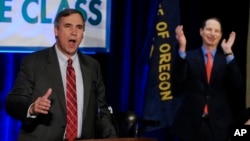Another U.S. senator, Democrat Jeff Merkley from (the western state of) Oregon, declared his support Sunday for the international accord to bar Iran from building a nuclear weapon.
Merkley became the 31st senator to say he will vote next month in favor of the pact, moving President Barack Obama closer to a mathematical certainty that the deal will take effect.
The deal, brokered by the United States and five other world powers, calls for international monitoring of Tehran's nuclear program, while United Nations and Western sanctions that have hobbled Iran's economy would be lifted.
No Republican support
The U.S. Congress, with both chambers controlled by Obama's Republican opponents, is set to vote on the pact in mid-September. No Republican has voiced support for the deal and analysts are predicting the House of Representatives will vote to reject it.
In the Senate, however, the vote is closer, with the 54-member Republican majority needing six Democrats to oppose the deal in order to secure the required 60-vote supermajority in the 100-member chamber to defeat the deal. So far, only two Democrats have announced their opposition.
If both the Senate and House reject the deal, Obama says he will veto the measure, forcing both houses to muster two-thirds majorities to override the veto. In the Senate, 34 votes would be enough to sustain a presidential veto, and with Merkley's support, Obama is now three away from that figure.
Obama's Democratic supporters in the Senate are trying to win even more support for the deal, from at least 41 senators, which would eliminate the need for him to veto a rejection.
'Significant shortcomings'
Merkley said he thinks the deal has ``significant shortcomings,'' but that it is the best path to blocking Iran from acquiring a nuclear weapon.
"Because of these shortcomings, many have argued that the United States, instead of implementing the agreement, should withdraw from it, persuade our partners to set the agreement aside and work together to negotiate a better deal,'' Merkley said. ``However, the prospects for this are slim. All of our partners ... believe that the current deal _ in regard to its central goal of blocking Iran's pathways to a nuclear bomb _ is sound. They have committed the good faith of their governments behind the agreement and intend to honor the deal as long as Iran does likewise, with or without the United States.''





